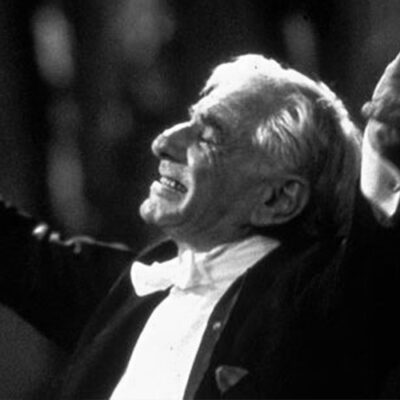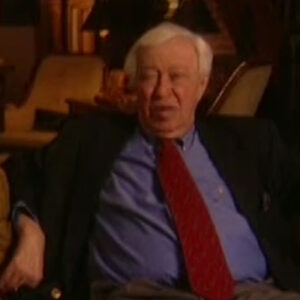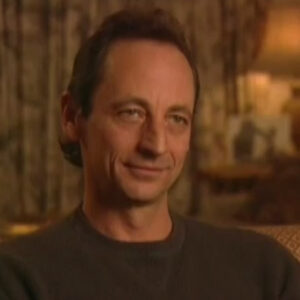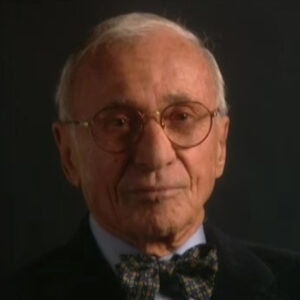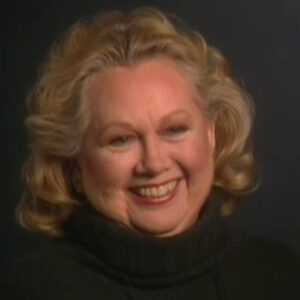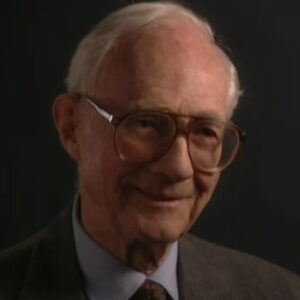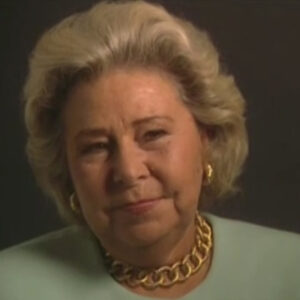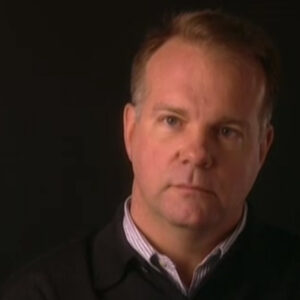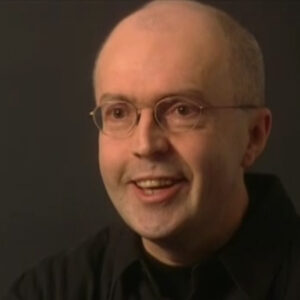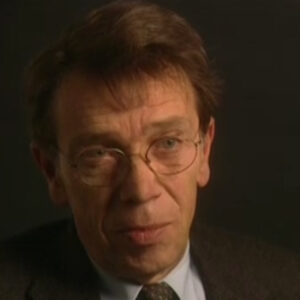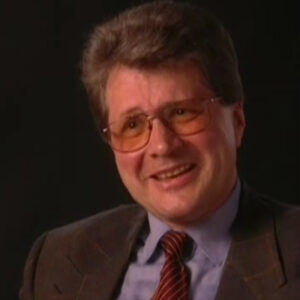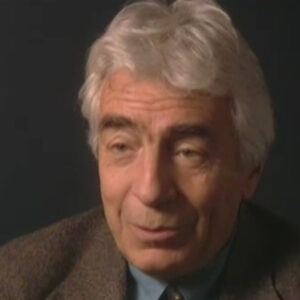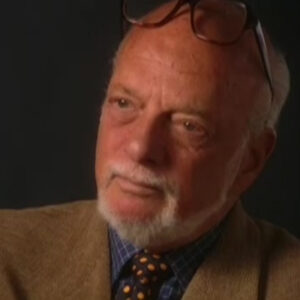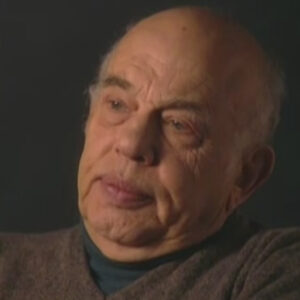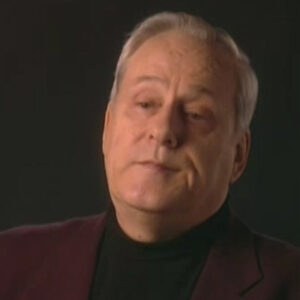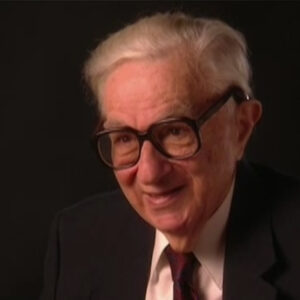Speaker Can you describe Lenny’s conducting style, conducting style? I mean, it’s been called Dionysius.
Speaker Well, there’s a lot of dancing. He did a lot of beating.
Speaker I mean, you might have a ForFour bar, but there might be six beats within it.
Speaker And I don’t know that there was any conducting style except something that changed all the time in accordance with the way he felt. And basically the conducting style from the standpoint of one, two, three, four is not as important to many of us as an indication of movement, an indication of where you’re going or what you’re doing, and that he could do not just with his hands as he did that with his whole body, which was the whole attitude. So in actuality, I think that the conducting style was not exactly predictable. It changed with the moods, change with the piece. And so it would be very hard to go ahead and give it a set name. Which is for me, something that is preferable to having someone who is actually completely always regimented, I mean, music is not a regimented thing.
Speaker That’s how you treated it.
Speaker Yeah, that’s you started to talk about that. Something to ask you. I’m always very curious about this. What does an orchestra look for in conducting?
Speaker Well, my colleagues will often tell you that they’re looking for the beat. I think that many of them are fooling themselves when they’re saying that it’s a safe way of saying things, but they are looking for movement. You don’t always need the beat, but you do need to have the movement set at the beginning of a piece, and it has to. And if it’s a movement that is logical, that is emotionally logical, that is musically logical, and then you don’t need the one, two, three, four all the time. You need only an indication of where it’s going. On the other hand, if you go ahead and you have the one, two, three, four in, that’s all you’ve got. You’ve got no music. And if you can go ahead and emote the movement element, the mood of the piece, then the actual what you actually do with your hands is not terribly important. I mean, I’ve had I’ve seen conductors who were absolute masters with the with a beat and they were horrible failures as musicians.
Speaker Can you can talk about the. That means, well, what’s the difference between the movement?
Speaker Well, movement is every piece, every piece of music for me anyway, is either a song or a dance or a combination. If you can go ahead and show you’re the instrument you’re using in the orchestra. Exactly what kind of a dance and or song it is, that’s fine. And you don’t have to go ahead and actually show where the one comes in, whether to consider it because it’s a natural progression. If you have a natural sense of music within you, the power that will show in your body movement and the body movement could occur in your eyebrows. Can occur if you move your ears. If that’s the case in Australia. And of course, Lenny always danced, you know. So one way or another, he could always show how he felt and the feeling of the piece was there and therefore the beat in itself was not always necessary. On the other hand, you’ve had some people who are tremendously good leaders, but that’s where it stops.
Speaker Lenny has said many, many, many times that the conductor’s job is to be one or two steps ahead of the orchestra. And I don’t quite understand what that meant.
Speaker Well, I mean, if he’s behind us, who are we going to follow? I mean, that’s one thing. So from that standpoint, he’s right. But in effect, what he did and he did this all the time, I think he would emote what he felt on the podium. Without too much sense of discipline and in fact, we were able because we understood, everyone understood it well, that’s one of the things that people in the audience would come in and say to us all the time. You know, I heard this piece of music and just by watching him, I knew what it was about. And so by watching him, we knew what it was about. And if he was ahead of us, we could follow. Of course. I mean.
Speaker If he’s one of the things that he may have said was that also that he had to anticipate the problems we might have with what he was trying to do and try to help us over that problem. And from that standpoint, he also had an inherent sense of of how we produce the sound. Now, if you’re going to go ahead and get a brass player in at a certain time, you have to almost know how he’s going to breathe in order to come in the way you want him to and sort of indicate so that it fits into what you’re going to do. If you don’t understand the way you produce sound on the instruments, you are not going to be able to actually be part of the process of producing that sound from that standpoint. Yes, you do have to be had and you have to know what you’re doing. So he could understand the way we would bow down on a violin. He could understand the way in which he has to prepare the sound and his instrument or our trumpet player would have to be very sound on his instrument to produce to the proper result.
Speaker And that is an innate talent that you don’t always learn.
Speaker Speaking when you look at it, there’s so many things that you just said. But I want to follow up. I want to forget about this.
Speaker I mean, Lenny came to music training for somebody with achieved stature that he did relatively late in life.
Speaker And he was already 10 years old when he discovered the piano for the first time. He was 12 years old, not his first concert, which is pretty surprising for someone who did what he did.
Speaker And he didn’t really get into the music till relatively late in life either. Do you how do you think that affected me?
Speaker Clearly, it was what I’m trying to get is there was some extraordinary gift that is almost unexplainable in some way.
Speaker You could talk a little bit about that, but also how the uniqueness of that made him unique as a conductor.
Speaker I understand that. Is that the way he communicated what he wanted was a little bit unusual.
Speaker You know, my father was a tailor and what I was very young. He used to whistle when I used to practice. No matter what piece I played, he whistled the better.
Speaker This is something that comes that is with you. I think that the musicianship and the tie that Lenny had to music was one that was for me. It was always based to a great degree in Yiddish. Right. You know, in this background that he came from where music is an outpouring of yourself and the training then becomes a way of of owning the what’s there already. You don’t teach anyone this kind of thing. The only piece of how to use it in more, maybe more sophisticated manner.
Speaker But the training is there. It’s there from infancy, the music is in the man and how he uses it later on, maybe altered through training and how he behaves towards it, maybe all the training. But without that and with that, he can start at 10, 11.
Speaker You can start a world where he becomes harmful is indeed is if you’re playing an instrument at a time when maybe your bone structure is set and you have more problems.
Speaker But from the standpoint of the mind, which is which is what he worked with, basically that he became that good a pianist is again a product of that. But that was in him. It was not something he had to learn. If he had to learn it, he would never do what he did become.
Speaker Lennie’s emotionality on the podium has been the subject of great admiration and has been a subject of great criticism, and he was for many, most of his years as a music director, really tormented by the critics about his antics on the podium. Could you talk about that and incorporate the play in your answer that he was under fire from critics all the time?
Speaker He was under fire from critics all the time. That’s true.
Speaker And.
Speaker Maybe they were justified to a degree, certainly he was subject to excesses. I mean, there were a series there was a series of Haydn symphonies we did at one time, as a matter of fact, for which he was really he was blasted by the critics for.
Speaker But basically, it was Lenny making music the way he saw it at the time, I remember there was one rehearsal when somebody asked him, are you going to do that segment Tonight Show? How the hell should I know? I don’t know how I’m going to feel tonight. And basically, that’s what he did all the time. And maybe if I had been alive and yet heard the way, Lenny, that Hidemi was said, I wanted to do it in the first place. You know, he might have said that in any case, the person who was performing is the one who’s deciding what the work should be. Now, the person was criticizing is going on a set of concepts which may be totally unmusical. Now, he may have some very bad taste in some of the things that he may have done with Haydn and with some of these other words that he did. But basically, he should taste. It wasn’t something that was cultured. It was something that was dictated by someone else. It was something that he felt at the time and he was going to do would blast anything else. And he was heard by the critics. He would very often come into a rehearsal and actually said, you know, what they said about me and they’re not right. But what he did was something that was instinctive. And therefore, if he had tried to limit it, he would have been false. It would have sounded phony. And whether it was good taste or bad taste was for the audience to judge and for the critics to write about. But he had no choice. I don’t think he had a choice, the movements were not things that they’re dancing on the podium. Nothing that he did was not something that he planned for how he went through a whole recording session, not knowing what the noises were coming from until we found out they were. These were his noises. There was no audience there at the time.
Speaker So it was something that it was a natural outpouring. You don’t become a kind of composer. He was you don’t become the kind of personality you are that he was or the car or do the kind of conducting that he did without being natural. And taking the chance of being wrong. Being wrong or right was not the issue. The issue was to do what you felt like doing, and he certainly did that, what are some of the things I had heard?
Speaker Quote, I don’t remember which violinist it was, somebody who obviously didn’t didn’t didn’t appreciate Lanny Davis, who said that you were that you were great under Lenny as long as you didn’t look up, which I thought was rather kind of a cruel statement.
Speaker What do you think about that?
Speaker What he didn’t tell you was that you didn’t have to look up. Basically, everybody has peripheral vision. And he certainly he couldn’t fix you up. And there were times when he could foul up the whole orchestra with his antics, and he did. I’ve gone through it many times when the officer just could not play.
Speaker I mean, there was when Lenny wanted a soft passage, it didn’t go like this. When he started this, when we saw blood coming out of the hand, we knew we couldn’t put the boat over the string. And I remember doing rehearsing with Dvorchak Symphony in London when nobody could play. I mean, he was going through these hysterics over something that was really relatively simple. And, yes, he indulged in excesses.
Speaker So that when you didn’t know from one minute to the next what was going to happen, you had no predictions as to exactly what kind of performances you were going to give. The performances were all either they worked or they didn’t work or some parts of them worked. But this is when this man or this person man must have been a man went ahead and spoke about the fact that you were halfway set. If you didn’t look at him, you still looked at him and he saw him because he felt he could see the movement.
Speaker And there were there were times when what came out was absolutely fantastic.
Speaker Yes, there were times when it was the other way. I mean, you were taking a chance with Lenny. It wasn’t something that you were secure with.
Speaker Did that add to the excitement of it?
Speaker Added to the tension? It added to the tension, yes. There was a sense of tension. And of course, without tension, you don’t have performance. So it may not have always been the best way to get attention, but when it worked and there were times when it works, I mean, there were we had a tour in 68 through Belgium, starting in Belgium, ended up in Israel. And for some reason, no one can explain that. I’ve talked to everything went. Everything worked. We were doing a fourth and we’re doing 75 plastic and every performance was fantastic. This is what time when they seemed to be almost the stability to the natural list of the conducting. And it was great. And this used to happen.
Speaker But intermittently throughout the years in Israel, didn’t it culminate in the last something I don’t think was a minor segment with the March 4th?
Speaker It was the second they sat in the film Journey to Jerusalem in 1968 to.
Speaker It was the second by. But I remember that it was just the performances were great.
Speaker And that was when we had George Plimpton with us that year doing the bells at the same time I externalising. I don’t remember Isaac Stern being there. There were two or three trips to Israel. I don’t know. They were all with Lenny. But this was the 68 tour in the 68 tour. He never being especially good.
Speaker How do they. Can you describe that experience of being in Israel with learning? How do the Israelis respond to him?
Speaker Well, I think that I don’t remember Israel in particular, but I know that every time we went out of the country with Lenny, the response was fantastic. Where the response was sort of lagging was in the States. I mean, he was really had you been educated outside of the states and the states? Not so much.
Speaker And so the response in Europe was fantastic. Response in Fareast was fantastic. Almost anywhere in New York.
Speaker Different. When you say in New York, do you think you mean you taught me also that the audience.
Speaker The audience. Yes, also the audience. I mean, there were I mean, New York audiences were not as effusive.
Speaker As audiences outside and he was not. He didn’t seem to be as lionized in New York as he was in Europe or outside of the States. Why do you think is.
Speaker I think that.
Speaker Probably some of the antics on the podium helped to tone the audience response down, and there were a lot of antics.
Speaker I’m actually surprised because you didn’t participate in the television.
Speaker Yes, right. The Young People’s Concerts and earlier omnibus, which made him, of course, a celebrity everywhere. Probably the most recognized musician and certainly in the country maybe.
Speaker But he’d already written on the town. By that time, hadn’t he?
Speaker Yeah. Yeah. But in terms of celebrity. Yeah.
Speaker And just fame. Didn’t television make him a giant.
Speaker Oh yes. But that was not the live audience. The live audience was a subscription audience and a subscription audience were pretty tough cookies from that standpoint. I mean, it’s a different it’s a different crowd, surely, from the from the standpoint of television. Yes. I mean, the one hour shows were fantastic. Some of them thought they were absolutely great. And some of the young people also.
Speaker Can you talk a little bit about the young people’s concerts, what it was like and the young lives that, you know, just the experience?
Speaker Well, one of my first great experiences with a young people’s concert was I came home one day and my son, who was one of my sons, who was three or four years old, was on top of the table with a little hat in Nassau. And he was B and he was Petrouchka. And that’s when I knew the damn things worked, you know, and basically they did work. There was there was a rapport that he could establish. And he wasn’t playing to the children, really.
Speaker He was playing to the young parents, I think. And which is more important because the young parents sort of determine, you know, what the children are really going to feel and think. So it was when you looked out in the audience, it was the parents who were there with a rapt look on their face and the smiles and the responses. I mean, the kids might be doing what you expect kids to do, but the parents were the and there were young parents. And so as the children grew up, of course, they remembered these experiences, but through the eyes of their parents, perhaps more than through what Lenny had actually done to them directly. And he had a nice way of putting things. I mean, I remember him saying to the kids at one time during one show about talking about how important one of the things that’s important about a composer is the notes that he doesn’t write, which was a beautiful way of saying it. I’m saying that you’ve got to keep simplicity there. You know, it’s so weird to intrigue them.
Speaker And and then he used to sing and, you know, play at the piano and the kids loved it and the parents loved it much more than the kids. So from that standpoint, we’re building up a middle class, a middle, a middle aged audience for the parents. And the parents were making sort of bringing into their kids into the whole picture. I think it was a fantastic, fantastic time and a fantastic accomplishment.
Speaker What are some of the innovations that Lanny Davis music directors are thinking, particularly of Thursday night previews when they talk about that and any other one, did that work?
Speaker And you could talk about any comparison with other conductors? Would you be actually.
Speaker Well, the innovations from that, I mean, for me.
Speaker The greatest thing that he did was to bring the Philharmonic into the media field. I mean, it was the media innovations that were really important. The previews themselves went on for a little while. And his his his rationalization of having the previews was that the first concert we did was not so hot anyway. You know, it was a first concert. So we were going to call it a preview. Basically, it didn’t it didn’t really last, but it did last for a long time. Or the what we did with television, I mean, television was a very important thing for a long time. And it’s only now with the changing financial situation in the TV field and in the media field that we’ve losing out on that. But we set a record that may never be equaled with what we did, with what we thought could be done with television. And if people remember that maybe when the new formats come out like DVD and other things, maybe we’ll get back in there with someone else who has that kind of vision. And he certainly did. And for him, it was not a vision, was a sort of natural, that natural going into something that should be coming to. And for me, that is that is his great accomplishment, not what he did with the format of the concerts, we can do very little.
Speaker Did he do any program unusual, so many festivals.
Speaker Yeah, the contemporary festivals which were which were something we all had to go through, and there was a point when we were doing these aleatoric pieces, I remember doing a recording session, he says, let’s do the lavatory piece. So we went ahead and made a lot of noise for about one minute and a half is great.
Speaker We got it in one take, you know. And.
Speaker Somehow they he he didn’t treat them that seriously, I think many of the things that we did like the piece we did with with conductor on the podium and a machine, a clock going around showing exactly the other officers were to come in to look at me with kindness. So that was one of his big things putting on this and.
Speaker For us as musicians, these were things we had to go through, you know, it’s not the kind of thing that you that you like to remember unless you remember some jokes about it. Do you have any jokes about it? And that was the joke. The whole thing was a joke.
Speaker Commitment to expanding the repertoire to include American music, its focus on American music, and they felt they had a duty to include modern music.
Speaker I didn’t know it was quite clear that we love it. Two things that I did tell you that no one had the orchestra feel about the expansion of the repertory.
Speaker And how did the audience respond to the modern music.
Speaker I can remember the audience responded to modern music then the way they do today, and the orchestra responded to modern music then the way they do today. Basically, I mean, to say modern music is really putting a lot of modern music in the same pot and you can’t really do that. There is some good stuff and there is some stuff that you that should be left in a separate part that can be thrown out very quickly. So there are good works. And certainly he did a lot for Copland and he did something David Diamond and Harris and Barber.
Speaker I mean, he did a lot of good works that we performed. And then on the other hand, there was a lot of stuff that you would forget today as we forgot them at that time. So, I mean, the commitment every every I think every conductor feels a commitment to do something with modern music, they feel they’re obligated to where he is.
Speaker I don’t know if this is part of the story or not represented here, but the issue here of this is a personal story.
Speaker But I read that in one concert before a lot of music, before it comes up again, let me turn to the audience. He said tonight the orchestra is on the honor system.
Speaker Yes, well, I mean that I don’t remember that, but it sounds right. I mean, it just reminded me of something I’d forgotten. I mean, he did he did something with Gould also. You know, Gil, when Glenn Gould came in and he played one of the Brahms concerto, I don’t remember which one.
Speaker And Gould wanted to take an awfully slow tempo.
Speaker And First Lady came in during the rehearsal.
Speaker He came in with a shirt with Brahms, picture on, you know, a T-shirt, what he called it, you know, a sweatshirt with a Brahms picture on there. So he doesn’t go for this. And then before the concert, he did a disclaimer before the audience. He actually said, this is not what I would do. This is purely and blame. He’s on his own.
Speaker And the surprising thing was that when Gould came in and played the concert, exactly the way he was going to anyway and was not fazed by it, but he he would tend to go ahead and turn around and make a statement to the audience.
Speaker Yes. It was not unusual to talk to the audience. Yes. Yes. He would tell the audience like, yes, they love it. I think they loved it. I mean, any break in the routine is always loved by an audience. You know, they go to an operation, somebody fall, do something that’s wrong or they love it. You go to a concert, the conductor turns around and talks to the audience that they loved.
Speaker But that’s pretty unusual, right? Yes.
Speaker Conductor Zubin Zubin more than before, Lenny. I would doubt it. I mean, who barbarously. Certainly not the metropolis. Definitely not Walter. I don’t think so. And Toscanini? Certainly not.
Speaker Could you talk about Lenny in comparison to some of these?
Speaker You know, when Lenny came in, he came at that time, the orchestra with much older than it is now and the byword. Well, he’s no Toscanini, you know, so he had Toscanini to contend with.
Speaker And on one side, from the standpoint of the orchestra and on the other side as a composer, he was not being taken seriously by the critics.
Speaker Of course, now that new conductors come into what he’s not learning, you know, I mean, so we’ve run the gamut of things and. In some ways, I think he tried to. Be Toscanini or the background of Toscanini, and after a while, I think he just but this is something he couldn’t do because there was there was this natural exuberance about him that just took over. And thank God and thank God that it did, because otherwise he would have been just a second rate Toscanini instead of a first rate BROUNSTEIN and. And then, of course, after he left. Finally, he became you know, it’s just like the politician becomes a diplomat. He became I mean, he could do nothing wrong where before he left, he could do nothing. Right. According to the critics, after he left, that was it.
Speaker He was the top no matter what he did. And then he became the teacher.
Speaker And, you know, the the old man of music before he was the renegade and he was the irascible child, one that you couldn’t control it, the one to indulge in excesses.
Speaker After that, the excesses became standard.
Speaker I was asked to talk about why people had a problem with his nationality, because I’ve never understood that.
Speaker Well, they went to a Carnegie Hall concert with Milstein once at the end of it, he did a bunch of little droplets here in there, and a bunch of kids were there and coming out. He said, well, he played great, but no. They’ve got the inside track that I don’t have because I’m pretty much the way he felt like playing, and I think that people may be, generally speaking, have urged urge to have their lives regimented, Preordain told this should sound this way.
Speaker They should be like that and so on. It’s easy. And then once in a while, you get someone who comes out and he lets this outburst of emotionalism just burst forth. It unsettles some people and it makes him feel less sure of maybe what the values that they held all the time. Values are being attacked and so they divide the world into what’s good taste and what’s bad taste. And emotionalism is bad taste. Good taste is sort of something that can be predictable. But the audience is on the whole, don’t come to concerts in order to go ahead and be bored by the predictable. And so for them, the Access’s becomes the tale of success. It is the predictable that brings on the predictable applause, the predictable response and and the predictable bits of snoring when they fall asleep. Now, the critics couldn’t go along with that. And for that matter, many musicians don’t go along with it because the unpredictable makes it more difficult for them to go ahead and do their job. And very often, I think, just admit that it was very difficult to play with him. And there were times when he became totally unpredictable and it was impossible to play with him. But when his unpredictability and our flexibility mix, then you got something that everyone could respond to. It wasn’t the thing that was standard.
Speaker It may have been bad taste, but it was something that was occurring. It was something that was alive.
Speaker And it’s very often when you hear some of the old recordings, you know, it’s not always they’re not always perfect, they’re not always, but they’re always alive. There is always something alive about it. And that is that was his main concern, I think, always to be alive and to be active the minute. And of course, he could go ahead and do something that was totally unpredictable and then rationalize it as though it were really something that had all kinds of background. But that was all, you know, that was bull. And he was good at that, too. I mean, he could hand out and stuff like that, like he was manufacturing and every morning, you know, but basically it was the naturalness and that was making the audiences respond. And that’s what makes critics cringe. And some instrumentalists also, but the instrumentalists, no matter how much they complained, they knew inside that this was one way to go.
Speaker The musicians were spending.
Speaker The relationship between the musicians and Lenny was so personal. And the younger kids who came in later, respected in the all the people respect, was not the right word. I think it was they were involved and involvement was there. Yes. With respect that any part in involvement, I really don’t know. It seems like the wrong word to use in relationship to the kind of I mean, he would go a musician one day and say, thank God for Harold Gomberg, you know, think this incredible statement. And on the other hand, he could just as well go the other way, you know, and go in through a lot of cursing. So, I mean, this kind of relationship is not one that is based on one respect, it’s based on something a little more basic. I don’t know that I’d like to use that at all, but I think I mean is is I mean, I know that every day.
Speaker How many I mean, which was kind of unusual at that time. Yes. Could you say yes at that time?
Speaker Yes. As a matter of fact. Yes. Oh, yes. Everybody did call them that.
Speaker I mean, the funny thing was we had we had we got a tuba player was his name. I forget his name now.
Speaker I was with him at the Met before coming to Flama anyway, sitting together. You know, I was just letting you just called me to his room to talk about the tuba. There’s no I don’t know the guy, so I didn’t know I didn’t want to call him Lenny, so I called him Lynn.
Speaker But basically no one was going to go and call him Mr. Bernstine. And Maestro was not used to it was used once in a while.
Speaker But on the whole, it you know, he came into the orchestra so early, I said as an assistant and with so many older people that he was the kid coming in, you know, and they treated him like a kid. And so it was Lenny. And I think he. He fostered that himself. When he first started.
Speaker Was there a sense that he was kind of a whippersnapper and what’s he doing here and I mean, how did it work? How did he win? Because he did ultimately, from everything I’ve gathered, really when the musicians over. In the sense that they recognized that he was a great musician, but it was whether a change from when he first started so young would say, how did he get involved?
Speaker Did you talk about how it was felt? It. Well, I wasn’t I wasn’t there at the time. I mean, I just happened to be one of the younger men, you know, but. First of all, to establish some very close relationships with some of the players, I know that from when he came in right from the beginning, when he came in as an assistant.
Speaker And then I don’t think any of them would dispute the fact that when he conducted the concerts were. With somewhat events, you know, they were they were not the usual type of thing that you’d expect from the usual conductor.
Speaker Because there were always excesses and not every one of us could appreciate the excesses all the time, and there were many times when none of them appreciated them, but no one could ever deny his talent. And the talent is really what everything revolves around without it. You can’t afford excesses with it, you can afford all kinds of excesses. And it was a talent that was always there and everyone recognized it was impossible not to recognize.
Speaker Talk about letting in rehearsal and learning in rehearsal. And how did you communicate? I’ve got a lot of things about how we communicate. A sound he wanted wouldn’t always have the proper phrasing, the need to say, you know, something that, you know, he wanted a frog or he would describe some I want to sound like the air or whatever and then go out and talk about trying to figure out how to how to achieve.
Speaker What he wanted to do was that that even though his language was unusual, that the musicians actually really did understand that when he died.
Speaker I think we understood because it wasn’t only through language that he explained what he wanted, it was through movement.
Speaker And whether it was rehearsal or concert was the same thing.
Speaker And if he wanted to say that something was tortured and he would make a movement like this, he knew that it was lower sound with a little darker timber and almost constipated coming out. You know, you get the feeling of what was wanted because if you’re in Missouri does this, too, he will go ahead and tell you what he wants and the quality of the of the mood of the sound. And we figure out what the sound should be. And that’s why we are professional musicians, because we can go ahead and determine different timbers and different qualities that we wanted to sound. And so from that standpoint, he didn’t have to he would shouldn’t have to go ahead and tell a noble player, horn player, exactly what quality of sound he wants and how he wants it produced. He wants he tells you what effects he wants to accomplish and whether he is completely precise in his ways and one way or the other, whether it was with words or whether it was with movement or it was something of this type or, you know, whatever, you get the idea what he wants and you try to produce it. And when the sound comes out, he knows it.
Speaker So that dilemma in rehearsal. Was he a disciplinarian? Oh, boy, was he a disciplinarian.
Speaker He was worse than any of us. I mean, rehearsals with Lenny were full of discipline, as I don’t know who would compare him to, but there was none. There was one rehearsal for only one day. It was all very noisy.
Speaker All kinds of things went on. He’d come in, put his foot on the podium, smoking cigarettes. Once he came in with his with his dog, he had the dog. And therefore, I don’t know how many rehearsals because he was trying to give it away. Apparently the dog couldn’t be trained and he was trying to see how he could put it off on. And he finally did find someone to perform for the guy, took him home very proud of me. Let me give me his dog. Can you imagine? And the dog did all of the rugs and attacked his wife. And he started with a dog for about three or four weeks. Anyway, this was the rehearsals with the dog and the cigarettes and and the feed on the podium. And one rehearsal I remember finally, the boxer was also quite noisy. He bangs on a process, says, what the hell’s wrong with you guys? Can’t you be disciplined just for once? Can’t you already have to add so much noise? I mean, we’re trying to do some work here and everyone felt he was right. So we all shut up. He lasted not more than ten minutes. Just what the hell is this? A morgue. And that’s it. That was the rehearsals. That’s a good story, you know.
Speaker So what did he say?
Speaker Was that a problem? He said, no, there was no problem, Erin, not noticing we’re used to it.
Speaker And, yes, he would sing and he would make noises. But that’s something we’re used to. That’s no problem.
Speaker You said we were just beginning to talk earlier about trying to figure out the language of the musicians. You sat around a great deal asking that question.
Speaker There was many different things that I can tell you about who he was. He was a performer. I read or know that. The musicians that I talked to were I mean, it was a question of saying. You know, I don’t care about the recordings anymore.
Speaker I don’t care about the TV shows. Let him go. That’s enough. We had enough, you know, from the other standpoint. And they go the other way. You know, the moods were just as as changeable as he was. But.
Speaker I was going to say something and I forgot but who he was.
Speaker I want me to take. I think what made him tick.
Speaker Was the fact that he was undisciplined?
Speaker And because to a degree on this lack of discipline allowed the naturalness of what he would normally do to come out, and it just was his luck that the naturalness was correct, that his sense of theater was a right sense of theater. And certainly everything was theater with him. Didn’t make any difference what the piece was. It was theater. And so it was just this naturalness. That’s why he said no matter what, no matter what he does, no matter how bad he behaves, he’ll never be able to spoil his talent.
Speaker When you talk about bad behavior. Well, the jumping around and the excesses in living style, the excesses and everything that he did, you know, I mean, what he didn’t do with his life that would have ruined somebody else.
Speaker I don’t know. I mean, I don’t know the details.
Speaker But to this, he could not, you know, at one point it said something about his. And you described, you know, this this tie to the basics of life and title to the basics of making music, making music is an outpouring from inside, basically, and then it is cultivated. It’s all kinds of things with it. But without that basic instinct, basic instinct for drama. The Basic instinct for. For making some kind of statement.
Speaker He would have had nothing because he he could have spoiled everything, but that instinct was so strong that it came through almost everything that he did, even when he would be even in some of the pieces, like the correlational that he writes to the lyrics himself. You know, I mean, but there is that that basic thing that still comes out even in that. And though you may think of it, some things as accessories, as something that maybe not terribly good taste.
Speaker You feel what he wants to say. And what he wants to say is what you want to say. Or he makes you think that it’s what you want to say.
Speaker As you said earlier, that money never lost, that he said he never lost his roots.
Speaker Now, can you talk, in fact, that what you said?
Speaker Well, when I say that he never lost his roots, his roots were in the Yiddish world. As a matter of fact, there was so much Yiddish coming out of the podium.
Speaker We had one rehearsal when one of our people finally got up and started screaming at him. And this is what’s going on with the matter.
Speaker This is, you know, Nullable, not all of us are Jewish. And in effect, it didn’t stop anything, but there was a lot of this that came in into the general speech pattern all the time, and there was a lot of this that came out of the music making.
Speaker I mean, the fact that. Sometimes I think that German music is based on Yiddish music. That’s not true, of course, but in effect, it it humanizes everything that you do, whereby some people may have thought of Brahms or Bach as being things that are really dramatic and very tightly controlled.
Speaker The minute you put that little feeling that from the homeland into it, it becomes when it becomes song.
Speaker And he made everything into song or dance.
Speaker Or both, what are some of the highlights that you remember musically from your many years working play? Well, for me, the highlights were that tour that the 1968 tour is. The Mowrer and Stephanie Fantastique, these were the real highlights. It was something so satisfying about it. I never lost the feeling of satisfaction when I think of that tour.
Speaker When you mention Niemöller, I mean, we all know that my favorite musician, when he felt closest to spiritually, could you talk about that in some of the other composers that you feel had a special affinity for?
Speaker I think Copeland, I mean, could you put that in a sentence for me that’s very hard.
Speaker I mean, the affinity that he had, of course he had he had his ties, of course, were very close to Copeland, to Copeland, because Copeland took him on when he was so young and they had such a close relationship.
Speaker And in many ways, his music and Copelands can be compared to a degree. And he was a teacher and he was his friend.
Speaker And Tomala, yes, I think he did have a real sense of Möller because Möller also for me to represent those fruits I spoke about before, there was a certain the same type of root that you have in in the Yiddish field. Ed mother, on the other hand, could also spin out these from Melodist and things like the other Chettle, and it was completely it was it.
Speaker It was music was completely to the.
Speaker What do you call two? The is to.
Speaker The very thing that Lenny was accused of being, you know, living his his spirit guide, his every movement, and certainly Mahler is very subjective music. And it is very you can easily go ahead and make it something that is an extremely personal statement. It is a personal statement, and Lenny’s way of making music was also a very personal statement. And the gravitation tomorrow was as natural as anything could be. And from that’s from the standpoint that he was in a media then when he did Möller, that was so close to what he himself was made the combination one that everyone could respond to. You said that people like the wonderful.
Speaker Were there other what came in second, so to speak, in terms of what came in second?
Speaker It’s very hard to think of anything coming in second to to what was done with Möller. I had these experiences with with two conductors only there was one was Steinberg and the other one was with Lenny.
Speaker And what combating things come in third after that they got Beethoven and Lenny were there for the Berlin Wall. No, I didn’t know that was that was an international orchestra. I didn’t go back to Beethoven and Haydn. I think I started to say Beethoven was.
Speaker Wild, I mean, you go ahead and show, and I like it that way. Personally, I think that Beethoven has a certain forward movement and aggressiveness and he he catered to that, I think.
Speaker And, you know, this movement of the fifth you I mean, like he had a baseball bat in his hand hammering it out. The audience loved it. We didn’t mind it and it worked.
Speaker Haydn was a different matter in that Haydn. That’s where the critics went at him. And some of us felt that they were justified, that the excesses were there to too great a degree. I mean, there comes a time when you talk about good taste, bad taste, and there are certain variations that you can accept. Then sometimes you go outside of them and then it’s a matter of tolerance. And whether he was totally right or wrong in hiding, I don’t know. It certainly didn’t make the same kind of impression on me that Mahler did or that many other composers did, for example. But but Haydn is probably the only composer where I personally may have felt that the critics were not totally wrong.
Speaker What’s interesting, when you say things difficult as a person, of course, he was extremely difficult because he was unpredictable and he and he was very selfish, you know, he was catering. I mean, whatever he felt like saying at the time, he said whatever he felt like doing, he did.
Speaker And he was extremely difficult to deal with. I mean, in rehearsals, many people were come out quite upset at times, at the same time, he was he was a sucker for someone who was in trouble.
Speaker And.
Speaker There are times when it was a question of doing something that was one of the colleagues who demoting them or doing something else and all that I do was go into Lemi and put in a sob story and he fell for it each time. I mean, he was a real soft touch from that standpoint, as long as no money was involved.
Speaker But every other way he was extremely difficult to live with. He absolutely refused to be bound by the rules that we had work rules.
Speaker I mean, invariably we at one point we established something called the five minute leeway to rehearsals because he kept complaining, you know, I mean, you cut me off at 12, 13. I mean, how can you do that? You know, just like somebody having a love affair and a 12, 30 say that’s it. Either you you’ve done it or you haven’t done it. So I said, all right, for you, we’ll put in a five minute leeway. Well, what happened was that five minute leeway became part of the rehearsal. So then we had to take it away. And there were times when he’d call for overtime and I mean, he would call for things.
Speaker And if people just couldn’t make it, he would sometimes even get violently and, you know, very angry and get to the point where he threatened to leave. And all kinds of I mean, we always had problems of this type. He was not a person. That you could count on for real stability all the time.
Speaker That was not in of pardon me for the group of musicians within the of and with the management. And I mean, wasn’t it with the musicians more than the management?
Speaker Not to my knowledge. Nothing that I knew about that.
Speaker That is not the impression that I had and not any knowledge that I had. I’ve been very I’ve been very, very involved in committee business since I came in for many years.
Speaker And I don’t know that Lenny was of any help at any time. That way.
Speaker I know this is a curious thing, being a composer as well as a conductor, certainly not unusual, seems to be have become much more unusual today because I think it’s very difficult to do.
Speaker Yeah, but you’ve were many different conductors. Is there a difference and phrases to me. Give me back my question of this so that I have a sense here.
Speaker Is there a difference between working with a composer conductor as opposed to a pure conductor?
Speaker Is there a difference between working with a composer, conductor and conductor? I don’t know that I was ever aware of any.
Speaker I mean, for me, there is a difference between working with a conductor, musician and the conductor conductor. And from that standpoint. I think that Lenny would be classified as a musician, conductor. Rather than conductor, musician. And. I think that’s what makes him unusual. And that for him.
Speaker The talents of the musicians was so.
Speaker I know that the talents as a conductor did not have to be quite that high.
Speaker Really didn’t make any difference.
Speaker How did the how did you or other members of the orchestra feel about Lovesong composition?
Speaker They were always.
Speaker There were always things in them. I mean, no, just talking among us, which were highly with praise and others that were sort of.
Speaker A little bit maybe on the. Foeticide.
Speaker But there was always a certain naturalness about the writing there, too, and certainly if he had done nothing else but right West Side Story, nothing else, I mean, he’d have been made and a little serenade for a violin. So, I mean, there are you know, you can’t expect the work of great, great work all the time from composer, but he certainly has earned this place and he will keep it.
Speaker When he was accused all of his life by critics of screams of. Many people thought he should have made a choice whether going be conducted by something goes away completely changed the way, was going to do this later. And I think that remarkably well, perhaps the musicians and the musicians are still the orchestra.
Speaker Yes, musicians always, I think, feel that way. I think they always feel that they would like to get a little more central attention from whoever becomes certainly the music director. And they feel that that they should get there should be the main focus of his life.
Speaker And but that is a practical thing from their standpoint, whether it harmed Lenny from the standpoint of his artistic doings or not, I don’t think so. I don’t think there was any choice on his part. I think he I think he had to he had to be all of these things because there was no way of stopping any one of them. And you stop one of them, you stop them all. I mean, it’s like a machine that is dependent upon all its parts. You take one part out, everything else is going to go completely. And for him to have limited himself to truly conducting would have been impossible. Any more than limiting himself to full composing would have been just as impossible. He was a public figure. So I think that what he did was what he had to do and how we reacted to to it as well. No matter what we get, we always want more and we always feel we haven’t gotten enough.
Speaker So at Suketu, Lenny always said that he felt because he was a composer, that he brought and he wasn’t doing this as a braggart the way that he brought a different level of understanding to the music than somebody who wasn’t a composer.
Speaker And that with each composer that he conducted, he for that moment had to become a little bit that composer and that and I can’t help but think that that was really well affected his interpretations and why he might have been different from other interpretations.
Speaker Does that make sense?
Speaker Well, it makes sense from the standpoint that it sounds good when you say it.
Speaker But basically, he could have been a composer. And if he had not felt what he felt, naturally, it wouldn’t make no difference.
Speaker The fact was that being a composer made him more aware of the difficulties that other composers may have had in composing. And of the problems that they had in composing in the creative process, but whether it actually made him a better musician or not, I don’t know. I doubt it.
Speaker I think that probably that is something that came long before the composing took hold. But certainly composing probably would would have made him appreciate what other composers went through in the process.
Speaker Probably.
Speaker Why do I want to ask you, the way Lenin has described his relationship with the New York Philharmonic is the most and I’ve read everything, I mean, in a most loving way that between everyone there, there was a oneness and that when that oneness was at its best, that it was the highlight that nothing ever beat it.
Speaker It was the better than the best sex ever, you know. And they said that on many occasions. Do you feel any need to put this to me so that because remember, my question isn’t a part of this.
Speaker Do you feel that the orchestra felt that same way that you did?
Speaker Well, I know that Lenny did well from time to time. Expressed his. Had these huge outbursts of sentimentality from the standpoint of his relationship with the New York Philharmonic and with its members, and if he had described it as some kind of love affair and something that could be very rewarding and also could be very could go the other way as any marriage, any love affair does, you know, you have your fights and you have your make up.
Speaker And in essence, I think that was a very personal view. I don’t know, though, that it was completely shared by the orchestra themselves. But it was helpful, I think, in his relationship with the orchestra and that he could he could allow himself all kinds of freedoms by thinking this way, whether it was true or not, that he could not do, for example, perhaps in Vienna or in Berlin or in any of the orchestra that he conducted, there was a special relationship between the New York Philharmonic and Lenny. Maybe there was a special relationship between New York and London. Altogether, he seemed to belong in the place much more than he did in Boston, and he seemed to be made as the kind of spirit he had seemed to be. New York, the kind of music he wrote was New York, the kind of attitudes he had with New York and the New York Philharmonic certainly at that time was New York. And therefore, from there to deduce that there is a special relationship between himself and the orchestra was probably correct. Whether that relationship was always rewarding is something else.
Speaker That is something that depends very much on who you’re talking to as to what you’re going to say.
Speaker If you think about the orchestra felt this kind of silly question. But if there is such an affinity and a kind of oneness between conducting an orchestra, I always wondered if the orchestra ever felt abandoned or jealous when they are conductor went off to another orchestra.
Speaker Absolutely. Absolutely. Well, first of all, we certainly when when he started going to Vienna. And we started making recordings with Viena.
Speaker We felt that his place had been in New York, that his loyalties should have been to New York, and I think everyone blamed him for it and didn’t look very favorably upon these excursions into with other orchestras. And that went on as soon as he as soon as he stopped being music director.
Speaker And yes, I think the orchestra also did feel independent and felt that he should have been primarily still with us, that his place was with us, that BROUNSTEIN in the Vienna just didn’t make sense any more than Brounstein in Berlin, Bernstine in Israel. We accepted.
Speaker You know, but yes, there was a feeling that he should have had me, after all, and even when he left, he was made conductor laureate. But as he went on, he spent less and less time. And then he almost came back as music director, you know.
Speaker Before. Just before Zubaan.
Speaker There was there was talk with him for him to come back, and then just before he died, there were even more exciting talks about a summer program with him as director of the summer program that would involve us in the Juilliard Orchestra. And it had been a very exciting thing. It was pretty well on its way.
Speaker And of course, he deserted us again. But this time he died.
Speaker Can you just how did the orchestra feel when it was announced?
Speaker Of course, there was such a long period of time that they were going to resign as music director.
Speaker But can you actually describe the final concert? No, I can’t remember.
Speaker Remember, you know, there is such a you know, when you talk to someone like me that’s done, so many of them there are conscious that stand out and there are some that don’t. But they necessarily not necessarily because they were final concert or because and I don’t remember any kind of real emotional crisis when the announcement of the resignation was was made.
Speaker Oh, it’s five years before it finally resigned.
Speaker Well, that we got so I mean, I don’t remember any great occurrences and I certainly don’t remember the final concert.
Speaker It was one critic in The Village Voice described the final concert that after the last, you know, Downbeat and Lennie in the orchestra faced each other for at least three minutes before Lenny turned around, faced the audience. It was just a silence.
Speaker It’s just the emotional kind of it sounded wonderful if that if that happened, it was all engineered by Lenny.
Speaker He had a great, great, great sense of theater and that would have been good theater.
Speaker And he wasn’t going to give up a piece of good theater for nobody.
Speaker But that disappoints me. What’s your funniest story?
Speaker I think the funniest is the dog. The dog story is fabulous.
Speaker Did you have that ever in your what was your personal relationship between.
Speaker Well, I didn’t have much of a personal relationship. I mean, I made it a policy to stay away from conductors. And but there were there were times in spite of that, I mean, if my wife if we had a party or something, my wife would come in first and I wasn’t with her. The first thing he would say a lot of it is, was your husband. You know, I mean, I have to be in attendance. Everyone had to be in attendance. Apart from that, I don’t have any real personal stories.
Speaker You said that money could be very generous with the musicians, and another story I had heard was and I can’t remember which orchestra this was, so it may not be the Philharmonic, but maybe you have a similar story that everybody is working very hard. And it was during a rehearsal and one of the musicians fell asleep right before. So I just kind of nodded off and it was rehearsal.
Speaker Then he let it go and then of cut the actual I mean, I guess later there was another rehearsal and he came in and then he said to himself, where were you before?
Speaker Or something like that. I mean, do you have stories like that?
Speaker Few of these stories like that, Lenny, isms, things that were unique about him that you wouldn’t have had.
Speaker I mean, besides, there were there was you know, there were so many I mean, every rehearsal was full of learning days.
Speaker And it’s hard for me to remember these things. Very difficult. I mean, it was it was an attitude. You know, it was very loose, very.
Speaker Could be things every two minutes and after a while, you just don’t pay attention. I mean, I didn’t. So there can’t be much help be done.
Speaker Great. Thank you very much. Is there anything that you would like to say that I haven’t asked you? Please feel free to say anything you’d like to say.
Speaker I think we’ve covered a hell of a ground here, is there anything that you feel that I should have asked that I didn’t do you like I mean, anything you’d like to say?
Speaker But no, I mean, what I what I said is primarily the fact that this this this personality erupted, you know, like like a geiser, it was unstoppable. And sometimes if you needed a hot shower, it was just the right thing to get.
Speaker Thank you very much. OK.

